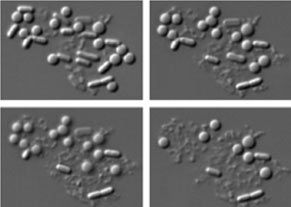Biologists often speak of switching genes on and off to give microbes new abilities–like producing biofuels or drugs, or gobbling up environmental toxins. For the most part, though, it’s nearly impossible to turn off a gene without deleting it (which means you can’t turn it on again). This limits biologists’ ability to control how much of a particular protein a microbe produces. It also restricts bioengineers’ ability to design new microbes.
Now researchers at Boston University, led by biomedical engineering professor James Collins, have developed a highly tunable genetic “switch” that offers a greater degree of control over microbes. It makes it possible to stop the production of a protein and restart it again. The switch, which could be used to control any gene, can also act as a “dimmer switch” to finely tune how much protein a microbe would produce over time.
The researchers made a highly effective microbe “kill switch” to demonstrate the precision of the approach. For years, researchers have been trying to develop these self-destruction mechanisms to allay concerns that genetically engineered microbes might prove impossible to eradicate once they’ve outlived their usefulness. But previous kill switches haven’t offered tight enough control to pass governmental regulatory muster because it was difficult to make it turn on in all the cells in a population at the same time.









Comments are closed.